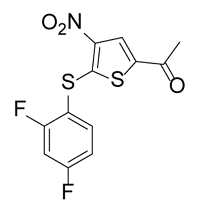All AbMole products are for research use only, cannot be used for human consumption.

P22077 is a selective inhibitor of ubiquitin-specific protease (USP) 7 with EC50 of 8.6 μM. P 22077 also inhibits USP47 with an EC50 of 8.74 μM. P22077 stabilized p53 by inducing HDM2 protein degradation in NB cells. P22077 also significantly augmented the cytotoxic effects of doxorubicin (Dox) and etoposide (VP-16) in NB cells with an intact USP7-HDM2-p53 axis but not in NB cells with mutant p53 or without human homolog of MDM2 (HDM2) expression. In an in vivo orthotopic NB mouse model, P22077 significantly inhibited the xenograft growth of three NB cell lines. P22077 treatment of U2OS cells during release from G1/S arrest induces with hydroxyurea resulted in a dose-dependent loss of claspin protein and a concomitant decrease in phospho Serine 317 Chk1.
| Cell Experiment | |
|---|---|
| Cell lines | The human NB cell lines |
| Preparation method | Cells with or without luciferase expression were seeded in 48-well or 6-well plates at appropriate concentrations. After incubation for 24 h, cells were treated with 0, 10, or 20 μM of P22077 for 24 h at 37 °C. |
| Concentrations | 0, 10, or 20 μM |
| Incubation time | 24 h |
| Animal Experiment | |
|---|---|
| Animal models | The orthotopic NB mouse model |
| Formulation | DMSO |
| Dosages | 15 mg/kg daily |
| Administration | i.p. |
| Molecular Weight | 315.32 |
| Formula | C12H7F2NO3S2 |
| CAS Number | 1247819-59-5 |
| Solubility (25°C) | DMSO 40 mg/mL |
| Storage |
Powder -20°C 3 years ; 4°C 2 years In solvent -80°C 6 months ; -20°C 1 month |
| Related Deubiquitinase Products |
|---|
| CMPD-39
CMPD-39 is a selective USP30 inhibitor with an IC50 of 0.02 μM. CMPD-39 increases protein ubiquitination and accelerates mitophagy. |
| FT709
FT709 is a potent and selective USP9X inhibitor, an IC50 of 82 nM. |
| XL177A
XL177A is a highly potent and selective irreversible USP7 inhibitor with an IC50 of 0.34 nM. |
| LDN-91946
LDN-91946 is a potent, selective and uncompetitive ubiquitin C-terminal hydrolase-L1 (UCH-L1) inhibitor with a Ki app of 2.8 μM. |
| USP5-IN-1
USP5-IN-1, a potent deubiquitinase USP5 inhibitor, binds to the USP5 ZnF-UBD with a KD of 2.8 μM. |
All AbMole products are for research use only, cannot be used for human consumption or veterinary use. We do not provide products or services to individuals. Please comply with the intended use and do not use AbMole products for any other purpose.


Products are for research use only. Not for human use. We do not sell to patients.
© Copyright 2010-2024 AbMole BioScience. All Rights Reserved.
